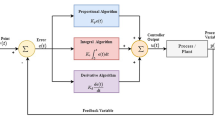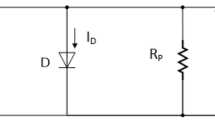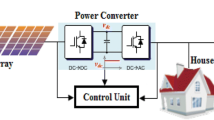Abstract
In this article, a maximum Power Point Tracking (MPPT) controller is designed for photovoltaic (PV) applications. This controller has been implemented with Fuzzy Gain Scheduling of Proportional–Integral–Derivative (PID) type controller (FGS-PID). To implement this controller, scaling factors (SF) for the input signals of FGS are applied. The recommended adaptive two-level controller has all the welfare of fuzzy logic system (FLC) and PID control. Zieglere–Nichols technique is used to fine-tune the initial PID’s gains. The PID’s gains are updated with FGS-PID in transient and steady-state conditions to cope with fluctuations, minimize settling time and ensure stability. FLC is used for gain factors to deal with tuning of conditioned input signals of the FGS-PID. Moreover, FLC and an improved shuffled frog leaping algorithm (ISFLA) are applied to tune the member functions (MFs) of FGS. The use of this algorithm can lead to automatic regulation of the triangular MFs. Simulations are done to confirm the edge of this approach over conventional methods. It is very fast and accurate in tracking the maximum power. It provides minimum oscillations and improved dynamic response than other approaches. The speed of the tracking is also improved with acceptable accuracy.























Similar content being viewed by others
Data availability
Enquiries about data availability should be directed to the authors.
References
Azali S, Sheikhan M (2016) Intelligent control of photovoltaic system using BPSO-GSA-optimized neural network and fuzzy-based PID for maximum power point tracking. Appl Intell 44:88–110
Chaiyatham T, Ngamroo I (2014) Improvement of power system transient stability by PV farm with fuzzy gain scheduling of PID controller. IEEE Syst J 11(3):1684–1691
Chopra S, Mitra R, Kumar V (2005) Identification of self-tuning fuzzy PI type controllers with reduced rule set. InProceedings. In: 2005 IEEE networking, sensing and control, 2005. 2005 Mar 19. IEEE. pp 537–542
Chouksey A, Awasthi S, Singh SK (2020) Fuzzy cognitive network-based maximum power point tracking using a self-tuned adaptive gain scheduled fuzzy proportional integral derivative controller and improved artificial neural network-based particle swarm optimization. Fuzzy Sets Syst 15(381):26–50
Eusuff MM, Lansey KE (2003) Optimization of water distribution network design using the shuffled frog leaping algorithm. J Water Resour Plan Manag 129(3):210–225
Eusuff M, Lansey K, Pasha F (2006) Shuffled frog-leaping algorithm: a memetic meta-heuristic for discrete optimization. Eng Optim 38(2):129–154
Ge X, Ahmed FW, Rezvani A, Aljojo N, Samad S, Foong LK (2020) Implementation of a novel hybrid BAT-Fuzzy controller based MPPT for grid-connected PV-battery system. Control Eng Pract 1(98):104380
Hai T, Wang D, Muranaka T (2022) An improved MPPT control-based ANFIS method to maximize power tracking of PEM fuel cell system. Sustain Energy Technol Assess 1(54):102629
Hai T, Alazzawi AK, Zhou J, Farajian H (2023) Performance improvement of PEM fuel cell power system using fuzzy logic controller-based MPPT technique to extract the maximum power under various conditions. Int J Hydrogen Energy 48(11):4430–4445
Hosseini SM, Rezvani A (2020) Modeling and simulation to optimize direct power control of DFIG in variable-speed pumped-storage power plant using teaching–learning-based optimization technique. Soft Comput 24:16895–16915
Isin E, Ibrahim E, Engin Y, Mujde G (2006) An intelligent hybrid fuzzy PID controller. In: Borutzky W, Orsoni A (eds) Proceedings 20th European conference on modelling and simulation 2006
Izadbakhsh M, Rezvani A, Gandomkar M (2015) Dynamic response improvement of hybrid system by implementing ANN-GA for fast variation of photovoltaic irradiation and FLC for wind turbine. Arch Electr Eng 64(2):291–314
Khan MJ, Mathew L (2021) Artificial neural network-based maximum power point tracking controller for real-time hybrid renewable energy system. Soft Comput 25(8):6557–6575
Kukrer O, Bayhan S, Komurcugil H (2018) Model-based current control strategy with virtual time constant for improved dynamic response of three-phase grid-connected VSI. IEEE Trans Ind Electron 66(6):4156–4165
Kumar N, Singh B, Panigrahi BK (2019) PNKLMF-based neural network control and learning-based HC MPPT technique for multiobjective grid integrated solar PV based distributed generating system. IEEE Trans Ind Inf 15(6):3732–3742
Loukil K, Abbes H, Abid H, Abid M, Toumi A (2020) Design and implementation of reconfigurable MPPT fuzzy controller for photovoltaic systems. Ain Shams Eng J 11(2):319–328
Mansoor M, Mirza AF, Ling Q, Javed MY (2020) Novel Grass Hopper optimization based MPPT of PV systems for complex partial shading conditions. Sol Energy 1(198):499–518
Mansoor M, Mirza AF, Ling Q (2020) Harris hawk optimization-based MPPT control for PV systems under partial shading conditions. J Clean Prod 20(274):122857
Mirza AF, Mansoor M, Ling Q (2020) A novel MPPT technique based on Henry gas solubility optimization. Energy Convers Manag 1(225):113409
Patcharaprakiti N, Premrudeepreechacharn S, Sriuthaisiriwong Y (2005) Maximum power point tracking using adaptive fuzzy logic control for grid-connected photovoltaic system. Renew Energy 30(11):1771–1788
Radhika A, Soundradevi G, Kumar RM (2020) An effective compensation of power quality issues using MPPT-based cuckoo search optimization approach. Soft Comput 24(22):16719–16725
Razmjoo A, Gandomi A, Mahlooji M, Astiaso Garcia D, Mirjalili S, Rezvani A, Ahmadzadeh S, Memon S (2022) An investigation of the policies and crucial sectors of smart cities based on IoT application. Appl Sci 12(5):2672
Rezvani A, Izadbakhsh M, Gandomkar M, Vafaei S (2015) Investigation of ANN-GA and modified perturb and observe MPPT techniques for photovoltaic system in the grid connected mode. Indian J Sci Technol 8(1):87
Saeed F, Yousuf MH, Tauqeer HA, Akhtar MR, Abbas ZA, Khan MH (2021) Performance benchmark of multi-layer neural network based solar MPPT for PV applications. In: 2021 International conference on emerging power technologies (ICEPT) 2021 Apr 10. IEEE, pp 1–6
Shengqing L, Fujun L, Jian Z, Wen C, Donghui Z (2020) An improved MPPT control strategy based on incremental conductance method. Soft Comput 24(8):6039–6046
Veeramanikandan P, Selvaperumal S (2021) Investigation of different MPPT techniques based on fuzzy logic controller for multilevel DC link inverter to solve the partial shading. Soft Comput 25(4):3143–3154
Zhang H, Zhou H, Ren J, Liu W, Ruan S, Gao Y (2009) Three-phase grid-connected photovoltaic system with SVPWM current controller. In: 2009 IEEE 6th international power electronics and motion control conference 2009 May 17, IEEE. pp 2161–2164
Zhao ZY, Tomizuka M, Isaka S (1993) Fuzzy gain scheduling of PID controllers. IEEE Trans Syst Man Cybern 23(5):1392–1398
Acknowledgements
This work was supported by Foundation of State Key Laboratory of Public Big Data (No.2023004), National Natural Science Foundation of China (No.61862051), the Science and Technology Foundation of Guizhou Province (No. ZK[2022]549), the Natural Science Foundation of Education of Guizhou province (No. [2019]203, No. KY[2019]067), and the Funds of Qiannan Normal University for Nationalities (No.qnsy2019rc09).
Funding
This study was not funded by any institution and organization.
Author information
Authors and Affiliations
Corresponding authors
Ethics declarations
Conflict of interest
Author declares that he has no conflict of interest.
Research involving human participants and/or animals
This article does not contain any studies with human participants performed by any of the authors.
Informed consent
The processes of program coding, numerical execution, and statistical analysis were based on personal computers. All authors agreed to publish this paper, if accepted.
Additional information
Publisher's Note
Springer Nature remains neutral with regard to jurisdictional claims in published maps and institutional affiliations.
Appendix 1
Appendix 1
VMP = 168.65 V IMP = 4.94 A Voc = 22.32 V.
Rights and permissions
Springer Nature or its licensor (e.g. a society or other partner) holds exclusive rights to this article under a publishing agreement with the author(s) or other rightsholder(s); author self-archiving of the accepted manuscript version of this article is solely governed by the terms of such publishing agreement and applicable law.
About this article
Cite this article
Hai, T., Zhou, J. & Furukawa, N. Performance enhancement of fuzzy-PID controller for MPPT of PV system to extract maximum power under different conditions. Soft Comput 28, 2035–2054 (2024). https://doi.org/10.1007/s00500-023-09171-z
Accepted:
Published:
Issue Date:
DOI: https://doi.org/10.1007/s00500-023-09171-z




